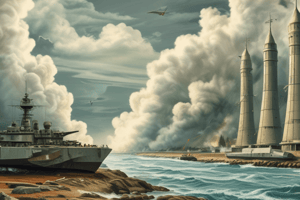Podcast
Questions and Answers
How did the NATO alliance and Warsaw Pact affect the Cuban Missile Crisis?
How did the NATO alliance and Warsaw Pact affect the Cuban Missile Crisis?
There were certain rules you had to follow to declare proper war.
Explain the pressure Khrushchev and Kennedy witnessed during the Cuban Missile Crisis.
Explain the pressure Khrushchev and Kennedy witnessed during the Cuban Missile Crisis.
Each leader was criticized for every move they made. This stressed out themselves and their families.
How is Cuba used in the Cuban Missile Crisis?
How is Cuba used in the Cuban Missile Crisis?
The reason Russia put missiles in Cuba was because the U.S. put missiles in Turkey aiming at Russia.
How is Turkey used in the Cuban Missile Crisis?
How is Turkey used in the Cuban Missile Crisis?
How would you describe JFK?
How would you describe JFK?
Give a summary about the Cuban Missile Crisis. Make sure to include key points, causes, and effects on both sides.
Give a summary about the Cuban Missile Crisis. Make sure to include key points, causes, and effects on both sides.
What did Robert Kennedy advocate for doing about the missiles in Cuba and why?
What did Robert Kennedy advocate for doing about the missiles in Cuba and why?
Explain the difference between offensive and defensive weapons.
Explain the difference between offensive and defensive weapons.
Why might the Soviet Union feel justified in putting offensive weapons in Cuba? What did Khrushchev outline as his reasons in his emotional letter to Kennedy? List at least 3 reasons.
Why might the Soviet Union feel justified in putting offensive weapons in Cuba? What did Khrushchev outline as his reasons in his emotional letter to Kennedy? List at least 3 reasons.
Before the letter, describe the position that Ambassador Dobrynin and the Soviet Foreign Minister took in the meetings with U.S. officials. What did they say they were doing in Cuba? Name at least two specific things.
Before the letter, describe the position that Ambassador Dobrynin and the Soviet Foreign Minister took in the meetings with U.S. officials. What did they say they were doing in Cuba? Name at least two specific things.
Flashcards are hidden until you start studying
Study Notes
NATO and Warsaw Pact Impact
- NATO and Warsaw Pact influenced military strategies and alliances during the crisis.
- Rules of engagement for war declaration were crucial in managing tensions.
Leadership Pressures
- Both Khrushchev and Kennedy faced intense criticism from their respective nations.
- Personal stress impacted their families due to the high stakes of the crisis.
Role of Cuba
- Soviet placement of missiles in Cuba was a counter to U.S. missiles in Turkey.
- Cuba was unable to freely act, being caught in the geopolitical struggle.
Role of Turkey
- U.S. missiles in Turkey were aimed at Russia, prompting Soviet response by placing missiles in Cuba.
Description of JFK
- Kennedy was considered thoughtful and focused on making decisions beneficial to America.
Overview of the Cuban Missile Crisis
- The crisis was the closest the world approached nuclear war between the U.S. and the Soviet Union.
- Initiated by U-2 spy planes discovering missile installations in Cuba.
- Kennedy ordered a quarantine to prevent further missile shipments and demanded missile removal.
- Khrushchev's agreement depended on U.S. non-invasion promise and removal of U.S. missiles from Turkey.
- Resolved within thirteen days, showcasing high tension and potential for nuclear conflict.
Robert Kennedy's Advocacy
- Advocated for a blockade of Soviet shipments to Cuba to prevent weapon transfers.
- The enforcement of this blockade heightened tensions between the involved nations.
Offensive vs. Defensive Weapons
- Offensive weapons directly attack an enemy, such as missiles and nuclear bombs.
- Defensive weapons intercept and neutralize threats, minimizing damage from attacks.
Justifications for Soviet Actions
- Soviet placement of offensive weapons in Cuba was seen as a response to U.S. missiles in Turkey.
- Khrushchev's reasons included protection from U.S. invasion, sign of strength against the U.S., and the need for Communist security.
Soviet Diplomatic Position
- Dobrynin and the Soviet Foreign Minister initially emphasized humanitarian aid for Cuba.
- Their statements reflected a denial of military escalation, focusing instead on supporting Cuban welfare.
Studying That Suits You
Use AI to generate personalized quizzes and flashcards to suit your learning preferences.





